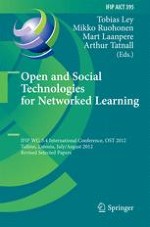2013 | Book
Open and Social Technologies for Networked Learning
IFIP WG 3.4 International Conference, OST 2012, Tallinn, Estonia, July 30 – August 3, 2012, Revised Selected Papers
Editors: Tobias Ley, Mikko Ruohonen, Mart Laanpere, Arthur Tatnall
Publisher: Springer Berlin Heidelberg
Book Series : IFIP Advances in Information and Communication Technology
